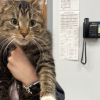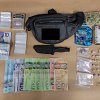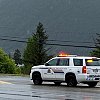After 11 years of trying, Anthony Marshall was finally able to give on Friday at the Kelowna Plasma Donor Centre.
"When I first tried to give blood in 2013 in Japan I wasn't allowed because I'd travelled to tropical countries (that may have malaria)," explained the ex-pat Brit, 43.
"And then a year ago when I attempted to give plasma here in Kelowna they told me I couldn't because of the 'mad cow' ban. But, they took my name and email and then a month ago I got an email saying I could now be eligible."
What changed, as of Dec. 4 in Canada, was that Canadian Blood Services lifted the donation ban for people who lived in or visited for an extended period the UK, Ireland and-or France in the 1980s and 1990s.

The concern was that anyone in those countries at that time could have eaten beef and contracted the human form of bovine spongiform encephalopathy, which is commonly known as 'mad cow' disease.
The disease can take years to show up in people and can be transmitted by blood in the meantime, thus the ban.
Time passed since the 'mad cow' issues in the UK, Ireland and France and research and surveillance by Canadian Blood Services now means potential donors who used to be ineligible are now able to donate.
The US and Australia lifted their 'mad cow' bans in 2022.
In Canada, Canadian Blood Services estimates it had to turn away 20,000 potential donors since 2003 because of the 'mad cow' ban.
However, in reality the number is probably much more because many people might have 'self-deferred' and never even attempted to give blood after hearing about the ban.

"We're now seeing first-time donors and donors coming back for the first time since 1999 (when the 'mad cow' ban started), " said Janna Pantella, the manager of the Kelowna Plasma Donor Centre.
Marshall is one of those first-time donors.
"I left England in 2002 at the age of 22 and hadn't ever given blood there," he said.
"After travelling and teaching English in seven countries (including Laos, Venezuela, Malawi and Japan) on five continents, I thought it was time to give blood. I'm happy I can now donate. My mom gave blood every month in England and that kind of inspired me. Plus, now that me and my wife and our three-year-old daughter live in Canada we're part of the community and use the Canadian health care system, so this is a way I can give back and help people."
Donated plasma is given to trauma, burn and shock patients as well as to those with liver disease and blood-clotting problems.
It's also used in medications that help treat people with immune diseases.
While most people are familiar with blood donation, not as many are familiar with plasma donation.
As with blood donation, a needle is injected into the arm to draw blood for plasma donation.
Whole blood comes out and goes through a centrifuge spinner to separate red blood cells from plasma.
Typically, 562 to 900 ml of plasma is collected (it looks like unfiltered apple juice, chicken broth or cloudy craft beer) and the red blood cells are pumped back into the donor.
Because they aren't parting with red blood cells, plasma donors are able to give more often -- every six days, compared to the whole blood donation stipulation of at least every 56 days for men and 84 days for women.
With the Kelowna clinic becoming plasma-only in 2021, it means if you want to give whole blood you need to do so at one of the Thompson Okanagan's mobile pop-ups in West Kelowna, Vernon, Penticton, Kamloops, Armstrong or Peachland.
The Kelowna Plasma Donor Centre has 3,200 registered donors who give regularly.
It makes Kelowna the No. 1 plasma centre of the nine in Canada.

"Despite COVID and wildfires and holidays, Kelowna responds to pleas for donations," said Pantella.
"We have lots of donors who come weekly or monthly. In the nine months ended Dec. 31, we collected 9,989 donations. We'll set a new goal at the end of this month and it will be more."
The Kelowna centre encourages all who are eligible to donate.
You can start the process by dropping into the centre for evaluation or visiting www.blood.ca.
Other recent bans that have been lifted for donors include some for men who have sex with other men and recreational drug users of cocaine and marijuina.
















